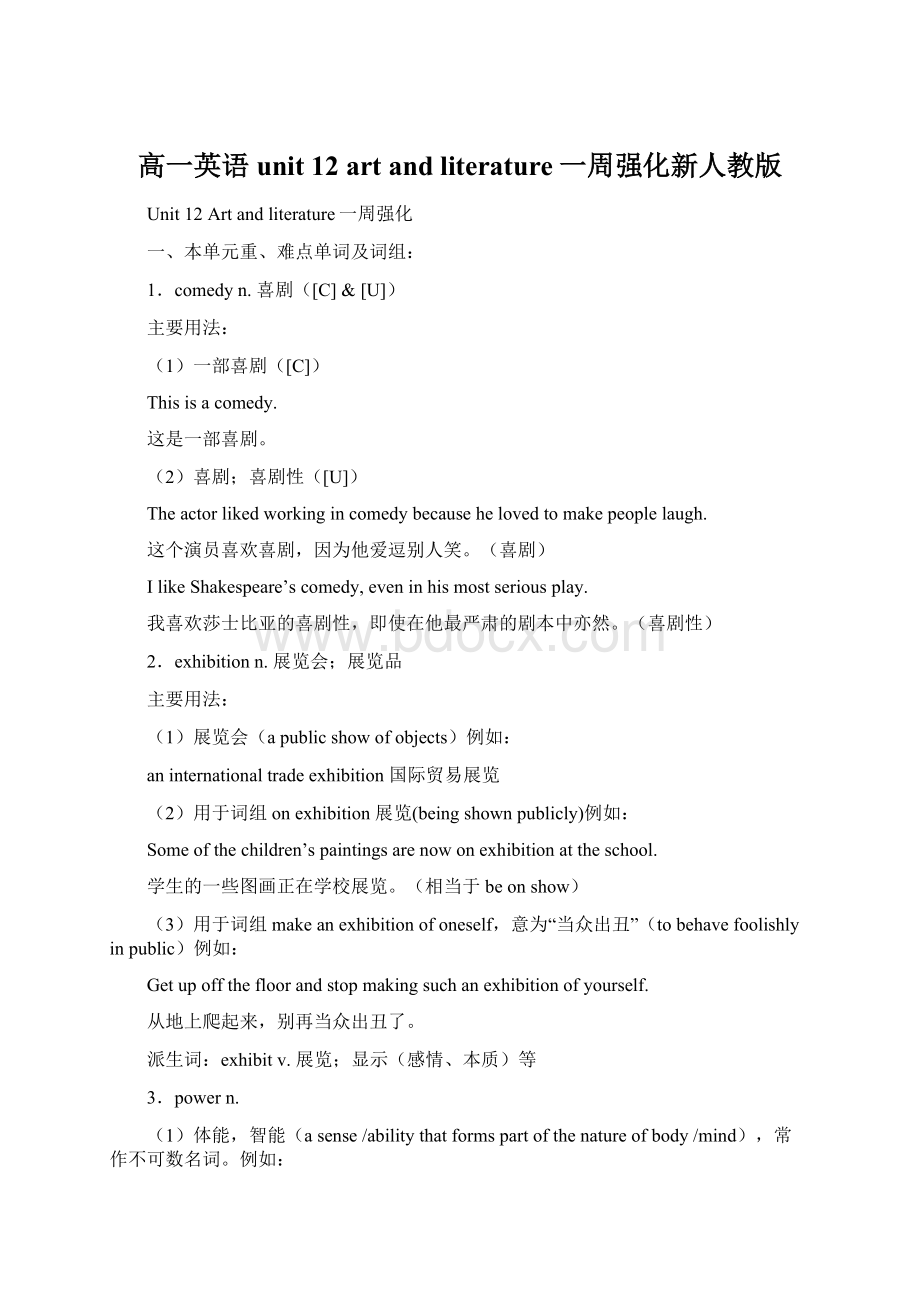高一英语unit 12 art and literature一周强化新人教版.docx
《高一英语unit 12 art and literature一周强化新人教版.docx》由会员分享,可在线阅读,更多相关《高一英语unit 12 art and literature一周强化新人教版.docx(11页珍藏版)》请在冰豆网上搜索。

高一英语unit12artandliterature一周强化新人教版
Unit12Artandliterature一周强化
一、本单元重、难点单词及词组:
1.comedyn.喜剧([C]&[U])
主要用法:
(1)一部喜剧([C])
Thisisacomedy.
这是一部喜剧。
(2)喜剧;喜剧性([U])
Theactorlikedworkingincomedybecausehelovedtomakepeoplelaugh.
这个演员喜欢喜剧,因为他爱逗别人笑。
(喜剧)
IlikeShakespeare’scomedy,eveninhismostseriousplay.
我喜欢莎士比亚的喜剧性,即使在他最严肃的剧本中亦然。
(喜剧性)
2.exhibitionn.展览会;展览品
主要用法:
(1)展览会(apublicshowofobjects)例如:
aninternationaltradeexhibition国际贸易展览
(2)用于词组onexhibition展览(beingshownpublicly)例如:
Someofthechildren’spaintingsarenowonexhibitionattheschool.
学生的一些图画正在学校展览。
(相当于beonshow)
(3)用于词组makeanexhibitionofoneself,意为“当众出丑”(tobehavefoolishlyinpublic)例如:
Getupoffthefloorandstopmakingsuchanexhibitionofyourself.
从地上爬起来,别再当众出丑了。
派生词:
exhibitv.展览;显示(感情、本质)等
3.powern.
(1)体能,智能(asense/abilitythatformspartofthenatureofbody/mind),常作不可数名词。
例如:
Manistheonlyanimalthathasthepowerofspeech.
人是唯一能说话的动物。
Someanimalshavethepowertoseeinthedark.
有些动物在黑暗中能看见东西。
(2)(办事)能力,作此义词常与the连用,作不可数名词(theabilitytodosthorproduceacertaineffect)。
例如:
Sheclaimstohavethepowertoseethefuture.
她自称能预知未来。
Hedideverythinginhispowertocomforther.
他尽力安慰她。
(相当于Hetriedhisbest/didallhecouldtocomforther.)
(3)力量(force;strength)作不可数名词。
例如:
Youcanreallyfeelthepowerofthesunsittingouthere.
你真正能感觉到太阳的力量。
(4)军力(常与其它词连用构成合成式名词)。
例如:
Formerly,seapowergavebignationsinfluenceoverothers.
以前海军的力量能使强国影响其它国家。
(海军)
(5)势力;影响力(controloverothers;influence),用作不可数名词。
例如:
Thepowerofthechurchinnationalaffairshaslessened.
教会对国事的影响力已减弱了。
(6)权力(righttogovern/togiveorders)作不可数名词。
例如:
Whichpoliticalpartyisinpowernow?
现在哪一政党执政?
(7)权限(righttoactgivenbylaw,rule,orofficialposition)例如:
Onlycertaindirectorsinthecompanyhavethepowertosigncompanycheques.
公司中只有几个董事有权签公司的支票。
(8)有势力者(有时大写,aperson,group,nation,etc.thathasinfluence/control)
Davisisapowerinthisfirm,itwouldbeunwisetoquarrelwithhim.
戴维斯在公司里很有势力,与他争吵是不智之举。
ThereistobeameetingoftheGreatPowers.
列强势将开一次会。
(thelargestandstrongeststatesintheworld)
(9)常用作结合式,指“力”。
Millsusedtodependonwindpowerorwaterpower.
磨坊过去依赖风力或水力操作。
(10)动力(作不可数名词thedegreeofthisforceproducedbysomething)
Whatisthepowerofthisengine?
这引擎的动力是多少?
(11)(数学)乘方
Theamount2tothepowerof3iswritten23,andmeans2×2×2.
2的三次方写为23,它的意思是2×2×2.
(12)apowerof+n.([U]),相当于alargeamountof或agreatdealof指“大量的”。
例如:
Yourvisitdidmeapowerofgood.
你来看我对我很有益处。
Morepowertoyourelbow!
祝你成功!
(相当于Mayyoureffortssucceed!
)
派生词:
powerfuladj.强力的
opp.powerlessadj.无力的,无能的
相关搭配:
powerpolitics(常贬义)强权外交
powerstation 发电厂
4.trickn.
(1)戏法;把戏;花样。
例如:
NooneunderstoodhowIdidthecardtricks.
谁都不懂我要牌的戏法是怎么回事。
(2)窍门;决窍。
例如:
Johntaughtmethetrickofpouringwinewithoutdroppingany.
约翰教我斟酒时不滴一滴的决窍。
(3)诡计,圈套。
例如:
Hegotthemoneybyatrick.
他这钱是骗来的。
(4)恶作剧。
例如:
Thechildrenlovedplayingtricksontheirteacher.
小孩爱跟老师恶作剧。
(playtrickson;playatrickon拿……恶作剧)
(5)怪癖
Hehasatrickoflookingatpeoplestraightintheeyetomakethemfeelguilty.
他有个怪癖喜欢盯着别人,使别人觉得不自在。
(6)开无聊玩笑
Whatanastytricktoplayonsomeonewho’ssupposedtobeyourfriends!
对自己的朋友开这种玩笑太过份了!
(7)用于词组dothetrick,意为“有效;达到目的”。
例如:
Thismedicineoughttodothetrick.
这种药应该很灵。
(curethedisease)
5.series
(1)n.连续;系列;连续的(事物)。
例如:
aconcertseries一连串的音乐会,相当于aseriesofconcerts.
atelevisionseries电视连续剧,相当于aseriesofshowontelevision.
(2)常用于aseriesof词组中。
例如:
aseriesofquestions 一系列问题
aseriesofLongMarchmemorialstamps 一套长征纪念邮票
(3)用于词组inseries.意思是“连续地;按顺序排列”。
6.treatv.
主要用法:
(1)看待;待遇(toact/behavetowards)例如:
Thisfirmhasalwaystreateditsworkerswell.
该公司一向对员工很好。
Shetreatsusas/likechildren.
她把我们当小孩看待。
(treat…as/like… 把……当……看待)
(2)处理;使用(dealwith)。
例如:
Wetreatallrequestsintheorderinwhichtheyarereceived.
一切申请我们都依收到的前后次序处理。
Theglassmustbetreatedwithcare.
这个玻璃杯要小心使用。
(3)以为,认为(toregard,consider)。
例如:
Myemployertreatedourrequestsasajoke.
老板把我们的要求当玩笑看待。
(4)馈赠东西给(某人);请(某人)吃、喝、玩等。
例如:
Maryalwaystreatherfriendstoicecream.
玛丽经常请她的朋友吃冰淇淋。
(treatsbtosth.请某人……)
I’mgoingtotreatmyselftoaholidayinSpainnextyear.
我明年要到西班牙度假去。
(5)作名词,指“愉快的事”(sththatgivespleasure,joy,ordelight,esp.whenunexpected)。
例如:
It’sagreattreatforhertogotoLondon.
到伦敦对她来说是件很开心的事。
one’streat指“某人作东”。
例如:
Nowrememberthisistobemytreat,soI’llpayforeverything.
别忘记这次由我作东,一切帐都由我付。
7.comeacross
主要用法:
(1)偶然遇见,碰到,相当于comeupon.(tomeet/discover,esp.bychance).例如:
I’vejustcomeacrossabeautifulpoeminthisbook.
我刚在这本书上偶然发现了一首美妙的诗。
(comeacrosssth)
Icameacrossoneofmyoldfriendsonthestreetyesterday.
昨天我在街上偶然遇见了我的一个老朋友。
(comeacrosssb.)
(2)发生效果;受欢迎(tobeeffectiveandwellreceived).例如:
Yourspeechcameacrossverywell;everyoneunderstandsyouropinionnow.
你的演说相当成功,大家现在都了解你的看法了。
(3)comeacrossas(从行为判断)像是。
例如:
Hecameacross(tome)as(being)quiteaniceperson,really.
确实他给我的印象是一个很好的人。
8.believein
主要用法:
(1)信仰;信任(tohavefaith/trustinsb.)。
例如:
ManypeoplebelieveinJesusChrist.
很多人信仰基督教。
(信仰)
DoyoubelieveinMaxism?
你信仰马克思主义吗?
(信仰)
(2)相信(considersthtobetrue/considersb/sthtoexist)。
例如:
DoyoubelieveineverythingtheBiblesays?
你相信圣经上所说的每句话吗?
(3)认为(某事物)有价值[toconsider(sth)tobeofworth]。
例如:
Jimbelievesinfreshairandexerciseforhishealth.
吉姆相信新鲜空气及运动有益于健康。
区别:
believe/believein
believe相对believein来说,只是强调表象上的一种相信,如某人的话。
believein则重在强调对某人的一种内有品质、能力的信赖,也可指某人的一种信仰。
例如:
Ibelievehim,butIdon’tbelieveinhimbecausehealwaystellsliestome.
我相信他说的话,但我并不信任他,因为他总对我撒谎。
9.habit
主要用法:
(1)习惯,习性,可作可数名词或不可数名词。
例如:
Ismokeoutofhabit/byhabit,notforpleasure.
我因习惯而非为了乐趣而抽烟。
(outofhabit/byhabit 出于习惯)
(2)fall/getintothehabitofsth/doingsth.染上……习惯。
例如:
Hefell/gotintothehabitofgoingawayeverySaturdaymorning.
他养成了星期六上午出去的习惯。
(3)have/beina/thehabitof…有……的习惯。
例如:
Hehasthehabitofgettingupearly.
他有早起的习惯。
(4)Itisahabitwithsbtodosth.某人有……的习惯。
例如:
ItwasahabitwithTomtoputhishandsinhistrouserspockets.
汤姆习惯把手插到裤子的口袋里。
(5)“戒掉习惯”,例如:
Itisdifficulttobreakawayfromahabit.
改掉一个习惯是困难的。
(breakawayfromahabit.)
Wemustbreakthechildofhishabitofbitinghisnails.
我们应该让这孩子改掉咬指甲的习惯。
(breaksbofone’shabitofdoingsth.)
注意:
habit一般指个人的习惯,而custom既可指个人的习惯,也可指团体、单位、民族等的风俗习惯。
10.shoulder
主要用法:
(1)n.肩,肩部。
例如:
Theywalkedonthestreetshouldertoshoulder.
他们肩并肩地行走在街道上。
(shouldertoshoulder肩并肩地)
相关词组:
sidebyside 肩并肩地
facetoface 面对面地
handinhand手拉手地
(2)v.肩负(重担等)。
例如:
Heshoulderstheresponsibilityofhighpoliticaloffice.
他在担负着高级官职的责任。
Heshoulderedhiswaythroughthecrowd.
他用肩膀在人群中挤过去。
(3)beuptoone’sshoulders 深深地陷入……。
例如:
Heisuptohisshouldersinwork.
他工作忙得不可开交。
11.whisper
主要用法:
(1)vt.&vi.低声说话,耳语;交头接耳;嘀咕。
例如:
Stopwhisperinginthecorner;saywhateveritisoutloud.
不要在角落交头接耳了,有什么话就大声说出来。
(vi.)
Shewhisperedafewwordsweaklybeforeshefelldown.
在她倒下前,她有气无力地说了几个字。
(vt.)
(2)(通常指风)飒飒、沙沙地响。
例如:
Thewindiswhisperingintheroof.
风在屋顶上沙沙地响。
(3)将(秘密)传开
Hisadventureshavebeenwhisperedthroughthevillage.
Hisadventureshavebeenwhisperedabout/everywhere.
他的历险事迹已经传遍了全村/传开了/传遍各地。
[将(秘密)传开,常用被动语态]
(4)n.耳语,低声,私话(作可数名词)例如:
Shesaiditinawhisper,soIcouldn’thear.
她低声地说,我听不清。
(inawhisper)
Icanhearthewhisperofthewindintheroof.
我能听到屋顶上沙沙地响的风声。
I’veheardawhisperthatoldBill’sgoingtolosehisjobnextmonth.
谣传说老比尔下个月要丢差事了。
(流言,谣言,传闻)
12.character
主要用法:
(1)字。
例如:
Chinesehasnoalphabetandiswrittenincharacters.
中文没有字母,是“字”写成的。
(2)文字或图形。
例如:
Iwishthisbookwerewritteninbiggercharacters,thesearesodifficulttoread.
这本书的字体大一点就好了,念起来很吃力。
(3)性格;品质。
例如:
Thekingisamanofgoodandnoblecharacter.
国王有优良高贵的品德。
(4)人(非正式)。
例如:
Somecharacterjustwalkedupandstoleherbag.
有一个人就这样走过来,偷了她的皮包。
(5)(书、剧中)人物。
例如:
Ifindallthecharactersinhisnewplayamusingandinteresting.
我觉得他的新剧中的人物都很有趣。
(6)职位,地位
Hewasthereinhischaracterasatownofofficial.
他以地方官身份出现。
(7)用于词组incharacter中,指“合乎个性”。
outofcharacter 指“与个性不符”
派生词:
characteristicadj.典型的,有特性的
n.典型;特征
二、重难点句子
1.…fillinthemissinginformationbelow. 填出下面省略了的信息。
(1)missing在句中作定语意为“省略的”,below作后置定语,类似的有above,else等置于所修饰的词后。
miss的意义较多,注意掌握。
如:
Tenhitandonemissed.
十次打中,一次未中。
(错过)
Thatwasaluckymiss.
幸免于难,真是侥幸。
(逃脱)
Hemissedthe9:
30trainandthereforemissedtheaccident.
他没赶上九点半的那班火车,也正因此而逃过那次车祸。
(错过)
Imissedthefirstpartofthespeech.
我没听到演说的第一部分。
Wemissedseeingthatfilmwhenitwasatthelocalcinema.
那影片在本地电影院上映时我们没去看。
(missdoingsth)
(2)missingadj.找不到的,失去的,失踪的。
例如:
abookwithtwopagesmissing掉了两个页码的一本书
thedead,woundedandmissing伤亡与失踪的(官兵)
missingpersons行踪不明的人
2.Usetherolecardsbelowtoactoutthesituations.
用下面的角色卡片,表演这些情景。
actout 表演出来
c.f.actas充当担任(角色)。
例如:
Theywillactoutsomefolkdances.
他们将表演一些民间舞蹈。
Thesemenwillactasguardsintimeofdanger.
这些人在危难时会充当警卫。
3.Hisfriendshelphimwhenheisintrouble.
他的朋友在他有麻烦时帮他。
beintrouble 处于困境之中
拓展:
beindanger 处于危险之中
beonfire 在着火/失火之中
beatbreakfast 在吃早饭
beatschool 在上学
beattable 在吃饭
beat/outofwork 上班/失业
4.Ifonlytheycouldfindawaytogettotheroom,orwhateveritwas,behindthewall.
如果他们真的能够找到一条通向房间的路,或弄清楚那堵墙后面到底是什么就好了。
ifonly“要是,假设”常用来表示愿望或未实现的条件,尤用于感叹句。
例如:
Ifonlyshewouldmarryme!
但愿她能嫁给我。
Ifonlyhehadknownaboutit(buthedidn’tknow)!
他那时要是知道(但他不知道)这事就好了!
5.…andthatnotallofthemweresafe.……并且并非所有的人是安全的。
notallofthem意为“并非所有的人”(部分否定)。
例如:
Notallofuslikethisfilm.
我们不是都喜欢这部影片。
(相当于:
Allofusdon’tlikethisfilm)
注意:
notall和all…not均表示部分否定。
如要表示完